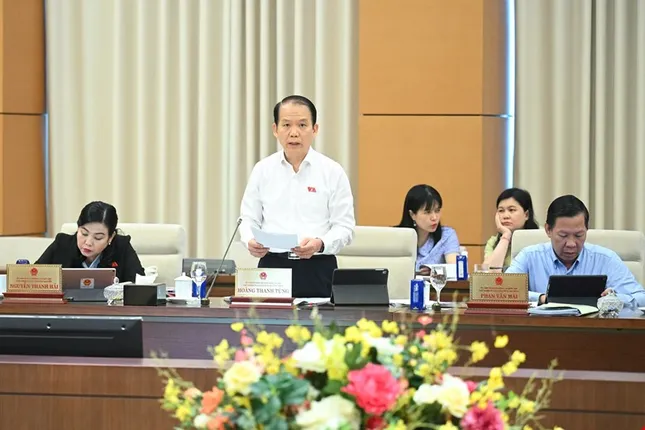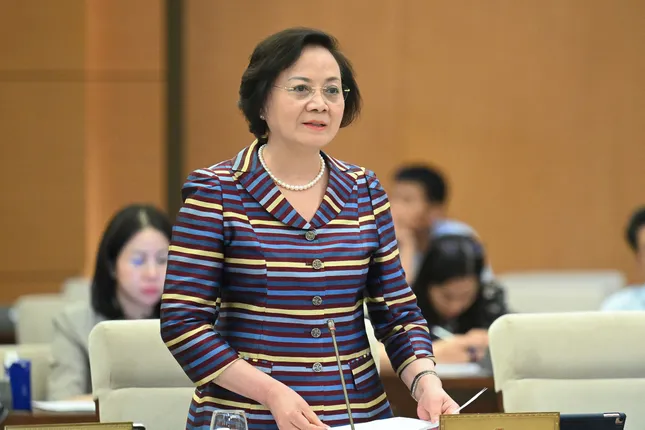The Need for Flexibility
Continuing the meeting agenda, on the afternoon of June 3rd, the National Assembly’s Standing Committee gave opinions on the proposal, explanation, and revision of the draft Law on Organization of Local Government (amended).
Notably, the amended draft law has added a provision that authorizes the provincial People’s Councils to delegate tasks to the People’s Committees and communal People’s Councils at the same level. This amendment aims to ensure consistency with the provisions of current laws and the realities of local governments.

Mr. Hoang Thanh Tung, Chairman of the Judiciary and Judicial Committee. Source: National Assembly of Vietnam
During the review, Mr. Hoang Thanh Tung, Chairman of the Judiciary and Judicial Committee, expressed the Standing Committee’s opinion that this proposal requires careful consideration. The People’s Councils are the representative bodies of the people’s will, aspirations, and sovereignty at the local level.
Therefore, transferring tasks and powers vested by law to the People’s Committees, which are the local government bodies, contradicts the nature, functions, and operating methods of each institution.
At the meeting, Ms. Dang Hoang Oanh, Deputy Minister of Justice, shared that the Government has thoroughly discussed this matter. In the context of promoting decentralization and delegation of tasks from the central to local governments, creating such flexibility is essential, according to Ms. Oanh.
If properly implemented, this proposal will encourage local governments to operate with enhanced proactiveness, flexibility, transparency, and accountability.
Moreover, this delegation of tasks will increase the autonomy and accountability of local governments. By proactively delegating tasks to the People’s Committees, the People’s Councils will foster a more proactive approach to governance and address various issues that arise in practice.

Ms. Pham Thi Thanh Tra, Minister of Home Affairs. Source: National Assembly of Vietnam
Overloading the People’s Councils
Providing further explanation, Ms. Pham Thi Thanh Tra, Minister of Home Affairs, acknowledged the accuracy and legal basis of the Judiciary and Judicial Committee’s argument. However, she highlighted that we are facing a new context with emerging development demands in a very special period. The Central Committee and the Politburo have emphasized the spirit of thoroughly delegating tasks and powers between the central and local governments and among different levels of local governments.
In terms of practical foundations, the Minister of Home Affairs pointed out that we are accustomed to the three-tier model of local government, but now we need to immediately transition to a two-tier model with a requirement for seamless, flexible, and synchronized operations.
According to the Minister, the total number of tasks to be delegated to the various levels of government is 1,470, with 1,065 tasks specifically pertaining to local governments.
“Among the tasks delegated to local governments, 40% are assigned to the People’s Councils, and the remaining 60% are assigned to the People’s Committees and their chairpersons,” emphasized Minister Pham Thi Thanh Tra. “With such a significant workload, the People’s Councils will be overwhelmed.”
The Minister also referenced the practices of countries like Japan, South Korea, France, and Canada, where tasks are delegated to their equivalent of People’s Councils to empower local governments to make decisions on matters of national and civic importance, specifically those that ensure timely service delivery to the people.
Based on the above analysis, Ms. Tra requested that the National Assembly’s Standing Committee consider including this content in the draft law.
In the future, with the adoption of the amended Constitution and the merger of provinces and communes, the Government will need to sign approximately 32 decrees simultaneously to delegate over 1,200 tasks from ministries and sectors to local governments.
“There are cases where local leaders complain about difficulties, but in reality, these issues are rooted in laws, decrees, and circulars that have not been effectively implemented,” Mr. Tran Thanh Man added.
The Chairman of the National Assembly also stated that with the upcoming delegation of tasks and powers, the secretaries and chairpersons of wards and communes will have a heavy burden, as they will be responsible for over 1,000 tasks delegated by the district and provincial levels.
Regarding human resources, the Chairman suggested that for the time being, the number of officials at these levels should be maintained as proposed by the Government. However, adjustments can be made later if necessary.
The Power of Proximity: Empowering the Grassroots with 1,060 Tasks
With 1,248 tasks delegated to local authorities, of which 1,060 are assigned to the commune level, experts believe that bringing governance closer to the people will benefit them greatly.
“Chairman of the National Assembly: Counterfeit Goods are Rampant, Yet No Agency Takes Responsibility”
“The Speaker of the House demanded a clear delineation of responsibilities among government ministries and departments. Despite the rampant issue of counterfeit and imitation goods, no single authority has taken primary accountability, underscoring the urgent need for defined roles and ownership in combating this pervasive problem.”
“Concerns Over Wasteful Office Space Usage: A Balancing Act for Efficient Utilization”
Chairman of the National Assembly Tran Thanh Man emphasized the importance of effectively handling the relocation of administrative headquarters during the reorganization of administrative units.





















